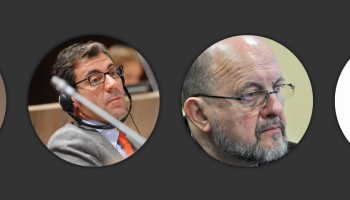The task force presented its amendments at the BiH Parliamentary Assembly on Wednesday and urged the four governmental bodies to accept them. The human trafficking codes of the State government are already up to the standards of this task force, and the Entity of Republika Srpska (RS) has recently accepted the committee’s recommendations and begun to strengthen its laws accordingly. But until the governments of the Bosnia-Herzegovina Federation and Brcko do the same, the lack of uniformity will continue to hinder trafficking prosecutions.
Because of this legal complexity, many trafficking cases have been prosecuted on the lesser charge of “inciting to prostitution,” which not only carries a weaker sentence, but also hampers victim support.
Victims of crimes classified as human trafficking are entitled to government-sponsored housing, where they receive food and clothing, as well as psychological, medical, and legal assistance. Prostitution cases do not offer victims the same resources and support.
When human trafficking victims are classified as prostitutes, “they are victimized twice,” said Aleksandra Pandurevic, president of the BiH Parliamentary Committee on Human Rights. “Strengthening legislation is critical for the protection of these victims,” said Fletcher Burton, head of the OSCE mission to Bosnia and Herzegovina.
The amendments would also make the use of human trafficking services a criminal offense across all four jurisdictions. Only some of the jurisdictions now treat such use as a crime, and the law is often poorly enforced.
On the State level, the Joint Committee proposed amendments that would limit prosecutors to to pursuing only cases of international trafficking.
Joint Committee on Human Rights, Rights of Children, Youth, Immigration, Refugees, Asylum and Ethics (JCHR) of the Parliamentary Assembly of BiH also proposed the amendments to BiH Criminal Code, in sense that the Code will cover only international trafficking in human beings.
Bosnia and Herzegovina’s weak prosecution of human trafficking has garnered criticism from the international community. The country last year lost the Tier 1 rating it earned from the United Nations’ High Commissioner for Refugees (UNHCR), after it failed to prosecute a single human trafficking case at the state level during 2011.
The aim of Wednesday’s meeting at the Parliament was to get the Federation and theBrčko district to agree, as the RS has done, to begin the process of adopting these amendments. To that end the event seemed to be a success, said the OSCE's SelmaZekovic, because representatives from both the Federation and Brcko appeared ready and willing to do so.





